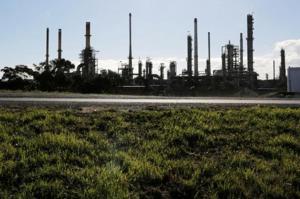South Africa oil workers' strike could hit refineries
(Reuters) South African energy workers plan to strike indefinitely from Thursday over pay, the union representing them said, a stoppage that will potentially hit oil refineries of companies including Shell, BP Chevron and Sasol.
Around 23,000 workers in the petrochemical and pharmaceutical sectors are expected to take part in the strike, Clement Chitja, head of collective bargaining, the Chemical, Energy, Paper, Printing, Wood and Allied Workers Union (CEPPWAWU), said on Wednesday.
"We want a deal of 9% in one year," Chitja told Reuters. He said employer associations were offering smaller increases and looking for multi-year agreements.
The National Petroleum Employer's Association (NPEA) said a weak economy at home and weak global oil prices meant they could only offer a 7% raise this year, and an April CPI plus 1.5% improvement factor the following year.
"In light of the economic conditions and where the industry is, given the global price decline, we believe our offer is reasonable and are hoping we will find each other," Zimisele Majamane, NPEA's deputy chairman, told Reuters.
He said they were assured by member companies that contingency measures were in place to see the strike through, "But it all depends on how long it takes and how intense it is."
Shell and BP jointly operate the largest refinery in South Africa, the 190 Mbpd plant along the east coast. Chevron, Sasol and PetroSA run smaller refineries.
South African petrochemical giant Sasol said it made arrangements to ensure minimal disruptions to customers.
The country is a net importer of refined petroleum products and long strike could lead to shortages. The strike also comes as the country votes next week in hotly-contested municipal elections.
The stoppage could also further damage the economy, which is forecast by the central bank to stagnate this year after expanding 1.3% in 2015.
Higher-than-inflation wage increases have been flagged by policymakers as a danger to an already weak economy.
Reporting by Wendell Roelf; Editing by James Macharia and Jane Merriman







Comments